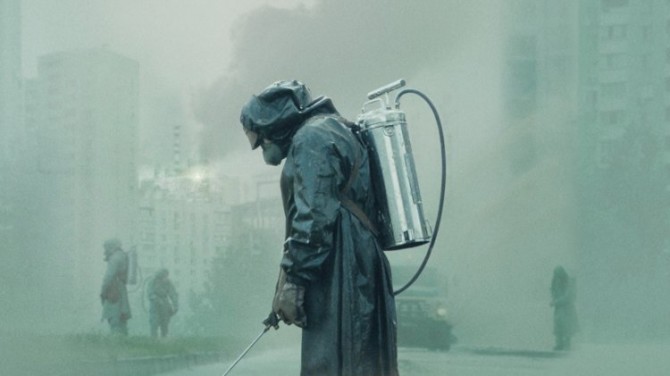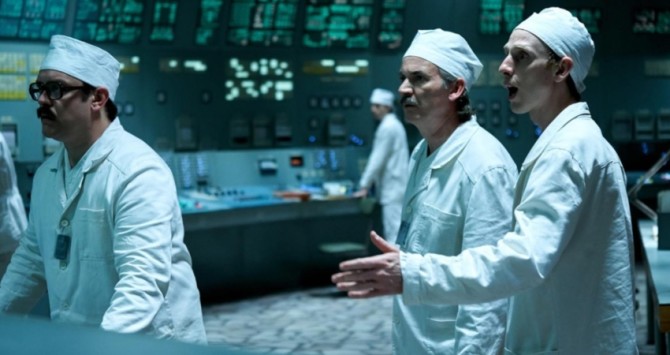Genre: Drama
Premise: The fallout from the 1986 Chernobyl nuclear reactor meltdown, whose damage was compounded by a corrupt government determined to cover up the severity of the incident.
About: Chernobyl snuck up out of nowhere to become a huge HBO hit. It has an unheard of 9.6/10 rating on IMDB. The show has stirred up controversy in Russia, where the Communist Party of Russia’s Sergey Malinkovich called the show disgusting and is trying to ban it across the country.
Creator: Craig Maizen
Details: This is a review of the first two episodes
I was sitting down this weekend, trying to figure out what I was going to review on Monday – the light as a buttery crepe “Yesterday,” or the heavy as a dead whale carcass, “Chernobyl.” The choice would’ve been easy had the two been evenly rated. I wanted to watch something fun. But Chernobyl’s review scores so outweighed Yesterday’s that I had no choice.
I bring this up because it’s something writers should be thinking about whenever they start a new project. They should imagine a consumer trying to make a choice. What is it about your movie or TV show that would make someone choose it over something else? It’s a bit of a mind f&*% because you can’t really get into the collective heads of everybody on the planet. But entertainment is one of the most competitive industries in the world. So if you aren’t at least considering the competition, you’ll come up short.
“Chernobyl” doesn’t waste any time getting down to brass tacks. After a brief flash-forward to show one of the chief inspectors hanging himself, we cut back to that fateful night where we see the Chernobyl reactor blow up. The chief engineer on site, Anatoly Dyatlov, dismisses the explosion, arguing that it’s a minor fire as opposed to a meltdown of the reactor core, which would be way more devastating. How devastating? Valery Legasov, the chief of the commission, later tells us that every hour that goes by where the core is exposed, it will be like 2 Hiroshima bombs going off. And unless they stop it, that could go on for 1000 years.
Back to Dyatlov, who informs his superiors that the radiation readings are only coming in at 3.6 R/s, which is bad but by no means lethal. He fails to mention, however, that their on-site dosimeters only measure up to 3.6 R/s. In other words, the meters are tapping out at the highest level they’re capable of showing. Meanwhile, Legasov, a professor who’s an expert in these matters, is flown to Chernobyl to assess the damage. He realizes immediately that this is no small fire. The reactor core has exploded. Which means Chernobyl isn’t spitting out a pithy 3.6 R/s, but rather 2000 R/s. In a meeting with Russian president Mikhail Gorbachev, he tells him that if he doesn’t plug up that reactor core, not only will tens of millions of people in Russia die, but millions of people in the surrounding countries will die as well.
Gorbachev teams Legasov up with Boris Shcherbina, a high ranking Russian general who seems more annoyed by this mess than worried. When they visit the heart of the site and see the devastating effects the radiation is having on the workers and residents, Boris changes his tune. The two will have to figure out a way to plug up the reactor core, an action that has no precedent in history. But it only gets worse. Legasov learns that the reactors’ tanks are all filled with water, which means a chemical reaction is inevitable. When that happens, there will be a gigantic nuclear explosion the likes of which has never been seen before.
One of the primary reasons Chernobyl is so good is that it builds its premise around dramatic irony. We, the audience, know a lot more than the characters onscreen. We know the radiation that’s been released is so devastating that this town is abandoned still to this day. So when the nuclear reactor workers are shrugging their shoulders saying this isn’t a big deal, we’re screaming at the screen, “YES! IT’S A HUGE DEAL! YOU NEED TO ACT NOW YOU DUMMIES!” That’s one of the great things about working through a dramatically ironic premise. The audience becomes actively involved because they want the characters to catch up to them.
This is the same reason Titanic worked so well. After the ship hits the iceberg, we’re gobsmacked that everyone is so calm. We’re screaming at them, “YOU NEED TO GET OFF THE BOAT! THIS THING’S GOING TO START SINKING AND YOU’RE ALL GOING TO DIE!”
Once the characters in Chernobyl begin to accept the gravity of the situation, traditional GSU sets in. Goal – Fill the reactor core. Stakes – Tens of millions of lives. Urgency – Not only could the core blow at any minute, but every second the core is exposed, Hiroshima levels of radiation are slipping into the atmosphere.
Actually, if I had to identify the single biggest factor for the show’s success, it would be the urgency. That’s because it isn’t your typical, “if we don’t find the bad guys, a bomb will blow up in three hours,” but rather EVERY SECOND they don’t do their job, more and more people are going to die. The “bomb,” in this instance, is ongoing. It’s blowing up every second. This provides the entire show with an unheard of level of urgency.
A geeky screenwriting thing Maizen does well is analogies. When you’re dealing with something complicated like a nuclear reactor explosion, you need the characters to convey to the audience what’s going on in a way that they understand it. Early on, Legasov gives Boris a rundown of what’s happening. He explains that radiation is composed of these tiny microscopic bullets. These bullets shoot out into everything, including humans, but we can’t see the damage as clearly because they’re so small. The higher the radiation, the more bullets there are. And he essentially says that the level of radiation being emitted from Chernobyl at the moment is the equivalent of a trillion times trillion bullets, all shooting at us at once.
That was the perfect analogy because now, even normal scenes where people are right outside the destroyed building, are tense. Because I’m thinking to myself, “They’re getting shot over and over and over again right now. Get away from this place!” That’s a huge part of what made this work so well. You’re constantly thinking, “Get this over with and get away from this place so you have a chance at a normal life.”
The human element in Chernobyl is almost as compelling as the white hot plot. The show continually puts its characters in the predicament of either telling the truth or towing the company line. Do you admit that the core has exploded or do you cover your a%&? Do you follow your superior’s orders even if it means thousands of people dying, or do you tell everyone to get off the island as quickly as possible? Even our most honest character, Legasov, finds himself assuring some Chernobyl residents that they’ll be okay because that’s what he’s been ordered to do.
The show only has one misstep so far, which is the subplot between Vasily, a firefighter, and his wife, Lyudmilla. Vasily is one of the first people called to the scene to put the fire out, but quickly becomes sick due to radiation, and must be transferred to Moscow. Lyudmilla goes from official to official, building to building, trying to find her husband, and eventually travels to Moscow to reunite with him.
The idea behind this subplot is sound. You want to humanize these events. You can’t just focus on the big plot points. We have to see how it affects the individuals, the “regular people,” who were ignorantly caught in the mess. The problem is that once Vasily is sent away and Lyudmilla follows him, they’re a million miles away from the story. The story is Chernoybl. Watching a couple of people nowhere near Chernobyl isn’t that compelling.
Contrast this with another subplot, Ulana Khomyuk’s storyline. Ulana is a nuclear physicist who lives far away from Chernobyl but senses something is off when she can’t get in touch with the facility. She then travels TO Chernobyl to tell them what she knows, and ends up helping the other scientists fill in the reactor core. The difference with this subplot is our character gets CLOSER TO THE ACTION, whereas with Vasily an Lyudmilla, they get further and further away. I call this the “Island Effect” and I’ll talk about it more in a second.
I have to give it to Maizen. He really stepped up here. On top of everything he did within the story itself, he also made the wise decision to go with a contained miniseries format. If this would’ve been a traditional TV series, he would’ve had to sacrifice the urgency in some way so that the story could last. But since the urgency is everything here, it had to be a mini-series in order to work. Very well done. Can’t wait to watch the rest of the show.
[ ] What the hell did I just watch?
[ ] wasn’t for me
[ ] worth the watch
[x] impressive
[ ] genius
What I learned: “The Island Effect” is when you take a subplot and move it far enough away from the center of your story (to its own “island”) that the audience doesn’t care about it. Vasily and Lyudmilla were too far away from the exciting stuff for us to care about them. I see this mostly with writers who overestimate side characters in their script, giving them major subplots that are independent enough of the main storyline that we don’t care. One of the most popular recent iterations of the The Island Effect would be the Canto Bight stuff in The Last Jedi.



